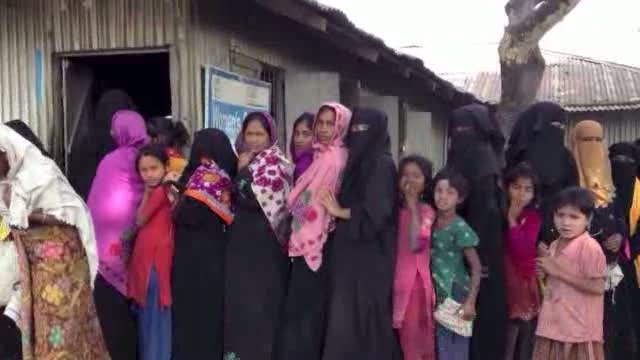Bangladesh: A UNHCR doctor's inventive care transforms a refugee's life
Telling the Human Story, 30 June 2010
KUTUPALONG REFUGEE CAMP, Bangladesh, June 30 (UNHCR) – With a smile on his face, refugee Kamal Hossain looks up from the mobile phone he is learning to repair to explain why he is intent on mastering these new skills: "I want to have a better future for my life."
It's only thanks to the extraordinary care – and craftiness – of a dedicated UNHCR doctor that Kamal has a life at all.
Kamal first came to the attention of UNHCR staff in Cox's Bazar, southern Bangladesh in January, 2005 when residents of one of the two camps here, home to 28,500 Rohingya refugees from Myanmar, began complaining of a stench emanating from one shelter.
Selim Reza Chodhury, then the field assistant in charge of the refugee agency's operations here, went to investigate.
What he found appalled him: Kamal, his back broken, was glued to a filthy sheet on the ground, in excruciating pain from enormous festering insect-infested bedsores – the source of the nauseating smell.
After leaving the camp to work illegally in Malaysia, Kamal, a mason, had fallen two storeys from a construction site and broken his back. His friends somehow got him back to the refugee camp to his cousins' shelter. But because he was no longer registered in the camp – and Bangladeshi authorities were not then allowing refugees to re-register – neither he nor his cousins dared seek help.
"He really needed to be sent to hospital, but if we sent him to hospital, he ran the risk of being arrested and sent to jail," recalls Dr. Zahid Jamal, the UNHCR doctor who was called in to help.
As the best possible substitute, Dr. Jamal, UNHCR's Medical Coordinator in Cox's Bazar collected bandages, antiseptic lotion, creams and ointments. He began visiting Kamal to care for him and trained Kamal's female cousin for the times when he couldn't come.
It took six months for his bed sores to heal, and the regular visits from many UNHCR staff members were a balm in themselves. "Whenever someone from UNHCR came to see me, my mind was at peace," Kamal says now. "I felt secure, knowing that someone was there to help me."
In December 2005, the government allowed Kamal to register with UNHCR. In 2008 he received a UNHCR identity card, an event, he says, that changed his life in ways that people born with official documentation cannot comprehend.
"When I had no identity, I had to hide, I was deprived of all services," he recalls, his face clouding over. "I could not go to a doctor even though I was in severe pain. I could not come out because I was afraid I might be arrested as an illegal migrant. I could not mix with people who were registered refugees. I had no freedom of movement. Now I get health support, and am getting skills training. Getting this ID card gave me a future."
Helping Kamal also transformed the life of Dr. Jamal. "This was my first experience in Bangladesh," he says, "and after him, I started looking for more refugees to help. I had been working for NGOs (non-governmental organizations) for 20 years, but the feeling I had after helping Kamal Hossain, I never felt before in my life.
"I am only one person who is looking out for refugees. UNHCR is the mechanism that ensures that people do not get left behind."
Kamal, now rolling around the camp in a wheelchair supplied by Handicap International and attending his mobile phone-repair classes every day, hopes to be resettled to a country where he can start a new life – but vows never to forget Dr. Jamal, wherever he goes.
"I will remember Dr. Jamal for my whole life," Kamal says simply. "Until I die, I will remember him."
By Kitty McKinsey
In Kutupalong Refugee Camp
















































